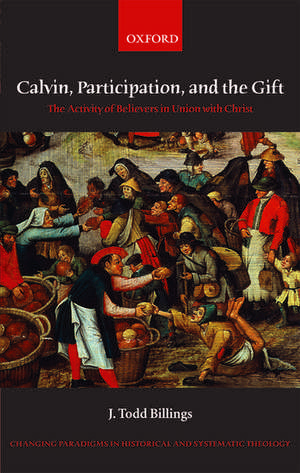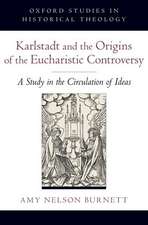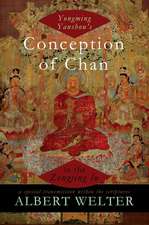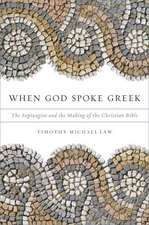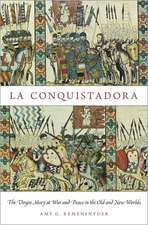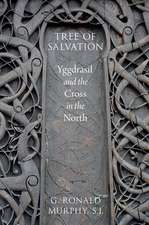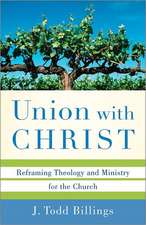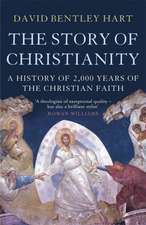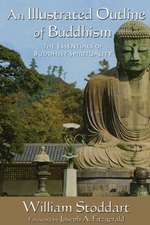Calvin, Participation, and the Gift: The Activity of Believers in Union with Christ: Changing Paradigms in Historical and Systematic Theology
Autor J. Todd Billingsen Limba Engleză Hardback – 15 noi 2007
Din seria Changing Paradigms in Historical and Systematic Theology
- 17%
 Preț: 190.88 lei
Preț: 190.88 lei - 12%
 Preț: 615.90 lei
Preț: 615.90 lei - 28%
 Preț: 474.06 lei
Preț: 474.06 lei - 30%
 Preț: 788.74 lei
Preț: 788.74 lei - 12%
 Preț: 308.75 lei
Preț: 308.75 lei - 14%
 Preț: 223.02 lei
Preț: 223.02 lei - 31%
 Preț: 801.39 lei
Preț: 801.39 lei - 26%
 Preț: 615.13 lei
Preț: 615.13 lei - 30%
 Preț: 585.56 lei
Preț: 585.56 lei - 25%
 Preț: 570.02 lei
Preț: 570.02 lei - 30%
 Preț: 587.57 lei
Preț: 587.57 lei - 25%
 Preț: 505.31 lei
Preț: 505.31 lei - 30%
 Preț: 587.96 lei
Preț: 587.96 lei - 27%
 Preț: 625.83 lei
Preț: 625.83 lei - 30%
 Preț: 501.97 lei
Preț: 501.97 lei
Preț: 816.02 lei
Preț vechi: 1240.33 lei
-34% Nou
Puncte Express: 1224
Preț estimativ în valută:
156.14€ • 163.47$ • 129.20£
156.14€ • 163.47$ • 129.20£
Carte tipărită la comandă
Livrare economică 27 martie-02 aprilie
Preluare comenzi: 021 569.72.76
Specificații
ISBN-13: 9780199211876
ISBN-10: 0199211876
Pagini: 232
Dimensiuni: 146 x 223 x 20 mm
Greutate: 0.43 kg
Editura: OUP OXFORD
Colecția OUP Oxford
Seria Changing Paradigms in Historical and Systematic Theology
Locul publicării:Oxford, United Kingdom
ISBN-10: 0199211876
Pagini: 232
Dimensiuni: 146 x 223 x 20 mm
Greutate: 0.43 kg
Editura: OUP OXFORD
Colecția OUP Oxford
Seria Changing Paradigms in Historical and Systematic Theology
Locul publicării:Oxford, United Kingdom
Recenzii
An attentive, stimulating interaction with Calvin's corpus, informed by the scholarly literature and bestowing upon it fresh insights into Calvin's theology at every turn.
Well-written and well researched... raise[s] important questions regarding the role of union with Christ in Calvin's theology.
Calvin's theology of participation, according to Billings, has theological, biblical and ecclesial promise. If you are interest in participation and Calvin, this is clearly the place to come, and his insight into contemporary issues make this volume a relevant, thoughtful and probing account of Calvin's theology.
...With this work Billings has made a major contribution to Calvin studies...This is a work of clarity and sanity, and displays Billings' thorough familiarity with Calvin's insights on the development of Calvin's theology, the sources of his thought, and offers an utterly convincing way to read his theology.
This is a valuable study of what is an important though much neglected theme of Calvin's. It should be read by all with an interest in Calvin's theology.
In the best sense, this is a work of deep theological recollection: with a view to rescuing Reformed theology from its Zwinglian captivity, it restores an appreciation for the catholicity of the Reformed tradition. In the course of defending Calvin against his radically orthodox despisers, Todd Billings carefully and persuasively articulates a vision of Calvin's theology as a source for contemporary constructive theology. And one could hope that the rich vision of sacramental participation he so deftly describes might trickle down into Reformed practice. Billings invites us to imagine how different our Reformed churches might be if they were actually "Calvinist."
This fine study by Todd Billings gives us fresh ways of looking at a familiar figure. Lucidly written, meticulous, precise and extremely well-informed, Billings' discussion of participation, that ancient Pauline category, opens the door both to new historical and constructive insights. An indispensable study for students of Calvin, historians of Christian thought and theologians of the Gift.
I know of no other monograph that offers such a comprehensive view of the theme of participation in Calvin's work. Billings makes a persuasive case for the central importance of this motif in the Reformer's thought. This is an erudite yet very readable book.
I warmly recommend Billings' book as a serious piece of scholarly research that is not afraid to tackle some of the more popular theological schools of thought in a manner that is respectful, thoughtful and analytically powerful. Billings is the first to systematically analyse Calvin's theology of participation. He manages to pull together a Calvinian doctrine of participation which can stand on its own strength and which presents a genuine, and in decisive ways original, contribution to Calvin research. Any further critique of of Calvin's theology as based on coercion or violence will have to give an account of Billings' masterful scholarship.
Billings has broadened our understanding of Calvin as one for whom God's grace and our faithful response form two parts of a whole... The bottom line is that this book matters.
This lucid and well-written book throws down a significant challenge to those concerned with the project of theology. ... It is not possible in a short review to do justice to the sophistication of Billing's careful reading of Calvin.
Well-written and well researched... raise[s] important questions regarding the role of union with Christ in Calvin's theology.
Calvin's theology of participation, according to Billings, has theological, biblical and ecclesial promise. If you are interest in participation and Calvin, this is clearly the place to come, and his insight into contemporary issues make this volume a relevant, thoughtful and probing account of Calvin's theology.
...With this work Billings has made a major contribution to Calvin studies...This is a work of clarity and sanity, and displays Billings' thorough familiarity with Calvin's insights on the development of Calvin's theology, the sources of his thought, and offers an utterly convincing way to read his theology.
This is a valuable study of what is an important though much neglected theme of Calvin's. It should be read by all with an interest in Calvin's theology.
In the best sense, this is a work of deep theological recollection: with a view to rescuing Reformed theology from its Zwinglian captivity, it restores an appreciation for the catholicity of the Reformed tradition. In the course of defending Calvin against his radically orthodox despisers, Todd Billings carefully and persuasively articulates a vision of Calvin's theology as a source for contemporary constructive theology. And one could hope that the rich vision of sacramental participation he so deftly describes might trickle down into Reformed practice. Billings invites us to imagine how different our Reformed churches might be if they were actually "Calvinist."
This fine study by Todd Billings gives us fresh ways of looking at a familiar figure. Lucidly written, meticulous, precise and extremely well-informed, Billings' discussion of participation, that ancient Pauline category, opens the door both to new historical and constructive insights. An indispensable study for students of Calvin, historians of Christian thought and theologians of the Gift.
I know of no other monograph that offers such a comprehensive view of the theme of participation in Calvin's work. Billings makes a persuasive case for the central importance of this motif in the Reformer's thought. This is an erudite yet very readable book.
I warmly recommend Billings' book as a serious piece of scholarly research that is not afraid to tackle some of the more popular theological schools of thought in a manner that is respectful, thoughtful and analytically powerful. Billings is the first to systematically analyse Calvin's theology of participation. He manages to pull together a Calvinian doctrine of participation which can stand on its own strength and which presents a genuine, and in decisive ways original, contribution to Calvin research. Any further critique of of Calvin's theology as based on coercion or violence will have to give an account of Billings' masterful scholarship.
Billings has broadened our understanding of Calvin as one for whom God's grace and our faithful response form two parts of a whole... The bottom line is that this book matters.
This lucid and well-written book throws down a significant challenge to those concerned with the project of theology. ... It is not possible in a short review to do justice to the sophistication of Billing's careful reading of Calvin.
Notă biografică
J. Todd Billings is Assistant Professor of Reformed Theology, Western Theological Seminary.
